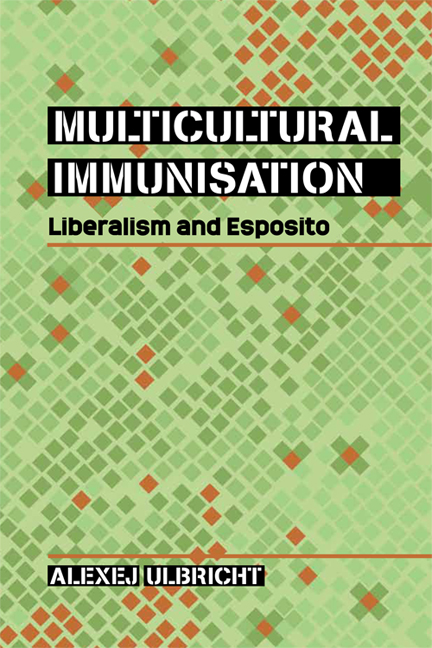Book contents
- Frontmatter
- Contents
- Acknowledgements
- 1 Introduction
- 2 Liberal Thought on Multiculturalism
- 3 Multiculturalism as a Mode of Immunising the Body of Liberalism
- 4 Liberal Multiculturalism and Rights: Citizens, Humans and Other Subjects
- 5 Disagreement and the Horizons of Consensus
- 6 Recognition: Tolerant, and Cunning
- 7 Multiculturalism Beyond Immunity
- 8 Conclusion
- Bibliography
- Index
8 - Conclusion
Published online by Cambridge University Press: 05 August 2016
- Frontmatter
- Contents
- Acknowledgements
- 1 Introduction
- 2 Liberal Thought on Multiculturalism
- 3 Multiculturalism as a Mode of Immunising the Body of Liberalism
- 4 Liberal Multiculturalism and Rights: Citizens, Humans and Other Subjects
- 5 Disagreement and the Horizons of Consensus
- 6 Recognition: Tolerant, and Cunning
- 7 Multiculturalism Beyond Immunity
- 8 Conclusion
- Bibliography
- Index
Summary
In this last chapter I hope to tie together some of the threads from what has preceded, and also to concretise some of the things I mentioned in the previous chapter. I will start by recapping the main markers of my argument. I will then turn to the more concrete: What does all this mean in practice? Where does what I have said leave us? The answers to these questions are always going to be to a certain degree unsatisfactory, as they cannot be given with any large degree of certainty, and drawing concrete prescriptions out of theoretical inquiry is not always easy. However, I will do my best to delineate a path that I find promising on the basis of the work done in the previous chapters.
LIBERAL MULTICULTURALISM AS A PROCESS OF IMMUNISATION
It has been my contention that liberal multiculturalism constitutes a process of immunising liberalism from the perceived threat of a foreign Other by partially incorporating it. Or more accurately, liberal multi - culturalism consists of a series of such immunitary mechanisms. There is no one single liberal multiculturalism; rather, there is a spectrum of theories that try to grapple with the issue of difference from a liberal perspective. It was never going to be possible to provide a compre - hensive account of how all these different approaches serve to immunise liberalism. I have therefore made some pragmatic choices about which theorists to focus on. And even within these theorists I limited myself, since I did not want to write a book on Kymlicka, Parekh and Taylor, but on liberal multiculturalism as a mode of immunisation. So I identified within each of these thinkers’ theories a particular feature, not because it is the only aspect of their work, but because their work serves particularly well to illustrate how such a feature operates. In this way the work of Kymlicka, Parekh and Taylor has served as an example of how three particular forms of immunisation (rights, consensus, recognition) operate within liberal theories.
I have traced out a brief overview of liberal approaches to difference. Liberal multiculturalism emerged as a broad term that describes a whole series of ways in which liberals cope with difference.
- Type
- Chapter
- Information
- Multicultural ImmunisationLiberalism and Esposito, pp. 167 - 188Publisher: Edinburgh University PressPrint publication year: 2014

